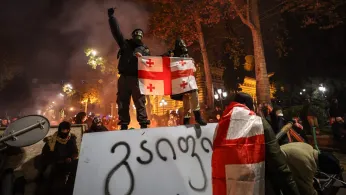
Crowds at the border
The only sure way to escape a call-up to the army and a rapid deployment to the front is to flee the country. Apparently, the Kremlin has decided that the risk of protests triggered by closing the borders is greater than the danger of a shortage of recruits, and five days after “partial mobilization” there has been no exit ban.
But it’s not so easy to leave Russia right now. Air traffic to Europe and North America was halted back in February, and the Baltic states and Poland have almost completely closed their borders. Tickets to countries where Russians can enter without visas surged in price on Sept. 21 and by Sept. 22-23 were almost completely sold out at any price. By Sept. 23, the cheapest generally available tickets for nearby Armenia or Turkey cost at least 200,000 rubles ($3,500).
As a result, huge traffic jams are forming at the few functional land border crossings into neighboring countries. The two most popular destinations are Georgia (which has only one border crossing with Russia) and Kazakhstan (where a 5,000-kilometer border passes 12 Russian regions). At all border crossings into these countries people are waiting for hours. In many cases, frustrated with the traffic jams, people are abandoning their cars and attempting to cross on bicycles or scooters (crossing the borders on foot is prohibited).
On Sept. 24-25, a friend of The Bell’s editors spent 54 hours trying to cross the Kazakh border in her car. On Sept. 23, it took 20 hours to cross the Georgian border. Another acquaintance of The Bell’s staff who reached the border on Sept. 24 waited 40 hours. He only made it into Georgia after abandoning his vehicle 4 kilometers from the border and paying $500 to a taxi driver who was waiting in line close to the checkpoint.
Border checks have become stricter since Saturday, adding weight to the persistent rumors that the borders could soon close. On Monday, four sources told The Bell that Russian airports started to receive mobilization lists over the weekend. Border officers are already carrying out more thorough checks on departing Russian men, denying exit to some. This does not affect everyone eligible for military service, only those for whom call-up papers have already been issued. So far, the exit bans are not widespread: a source at one Moscow airport told The Bell that 20 men were turned away the previous day. The exit restrictions apply to crew members as well as passengers, with reports of pilots and cabin crew being denied exit. In these cases, the member of the flight crew was replaced.
How does this affect the economy?
Although the parameters and scale of the mobilization are largely unclear, economists are already making early predictions. Alexander Isakov, who covers Russia and central & eastern Europe for Bloomberg Economics, issued a report based on official figures (300,000 conscripts). He estimates a further 0.25% drop in GDP as a result of mobilization, and an additional 0.5% rise in inflation over the course of 2022. The 300,000 men who might go to the army represent 0.9% of the male population aged 20-55. Isakov also warns that mobilization will spark a “brain drain” as the workforce heads to safer countries.
It is likely that the negative impacts of mobilization on the Russian economy will linger for several years. “We can base our conclusions on the experience of South Africa in the 1980s. Increased defense expenditure and public sector growth will have a structural impact that reduces potential annual growth to around 0.5% for the next five years,” Isakov wrote.
A combination of increased concern among the population and an expected rise in inflation, coupled with a further outflow of ruble deposits, could force the Central Bank to revert to its policy of raising interest rates – albeit not to the 20% seen in February – wrote Dmitry Polevoy, director of investments at Loko-Invest.
In the week after the mobilization was announced, Russian businesses dropped everything in their efforts to organize exemptions for their staff. So far, only two sectors have had much success: IT companies, telecoms operators and the media (as requested by the Communications Ministry), and banks and other financial institutions (at the request of the Central Bank). Companies in these industries have the right to ask for exemptions from the Defense Ministry based on a list compiled by managers. However, it’s not guaranteed that all employees will be exempt from service — and, moreover, only staff directly working in roles essential for communications and finance will receive exemptions.
Meanwhile, other industries are facing greater struggles. Aviation is a good example. Traditionally, this sector has strong lobbying powers. Yet five days after mobilization was announced, aviation companies have managed nothing more than an appeal to the Transport Ministry asking for exemptions for their staff. One airline employee told The Bell that the outcome of this request remained wholly uncertain.



